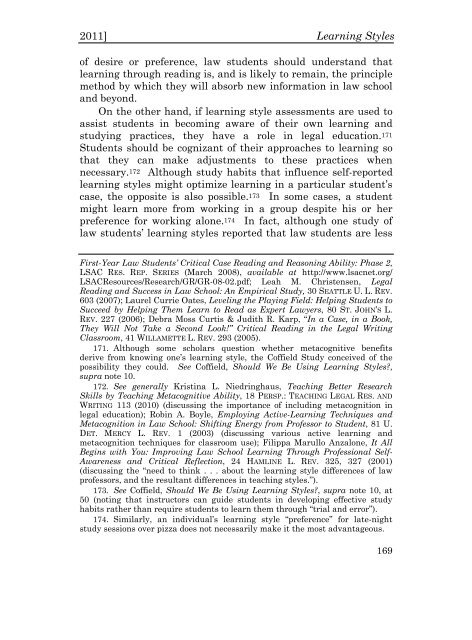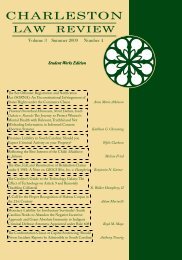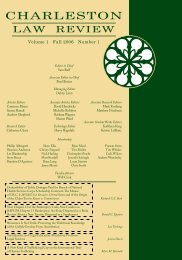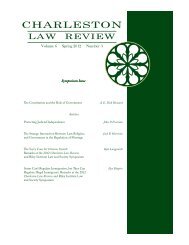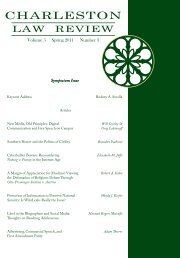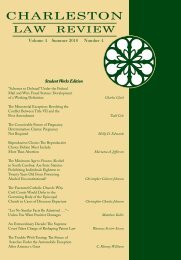Volume 5 Winter 2011 Number 2 - Charleston Law Review
Volume 5 Winter 2011 Number 2 - Charleston Law Review
Volume 5 Winter 2011 Number 2 - Charleston Law Review
Create successful ePaper yourself
Turn your PDF publications into a flip-book with our unique Google optimized e-Paper software.
<strong>2011</strong>] Learning Stylesof desire or preference, law students should understand thatlearning through reading is, and is likely to remain, the principlemethod by which they will absorb new information in law schooland beyond.On the other hand, if learning style assessments are used toassist students in becoming aware of their own learning andstudying practices, they have a role in legal education. 171Students should be cognizant of their approaches to learning sothat they can make adjustments to these practices whennecessary. 172 Although study habits that influence self-reportedlearning styles might optimize learning in a particular student’scase, the opposite is also possible. 173 In some cases, a studentmight learn more from working in a group despite his or herpreference for working alone. 174 In fact, although one study oflaw students’ learning styles reported that law students are lessFirst-Year <strong>Law</strong> Students’ Critical Case Reading and Reasoning Ability: Phase 2,LSAC RES. REP. SERIES (March 2008), available at http://www.lsacnet.org/LSACResources/Research/GR/GR-08-02.pdf; Leah M. Christensen, LegalReading and Success in <strong>Law</strong> School: An Empirical Study, 30 SEATTLE U. L. REV.603 (2007); Laurel Currie Oates, Leveling the Playing Field: Helping Students toSucceed by Helping Them Learn to Read as Expert <strong>Law</strong>yers, 80 ST. JOHN’S L.REV. 227 (2006); Debra Moss Curtis & Judith R. Karp, “In a Case, in a Book,They Will Not Take a Second Look!” Critical Reading in the Legal WritingClassroom, 41 WILLAMETTE L. REV. 293 (2005).171. Although some scholars question whether metacognitive benefitsderive from knowing one’s learning style, the Coffield Study conceived of thepossibility they could. See Coffield, Should We Be Using Learning Styles?,supra note 10.172. See generally Kristina L. Niedringhaus, Teaching Better ResearchSkills by Teaching Metacognitive Ability, 18 PERSP.: TEACHING LEGAL RES. ANDWRITING 113 (2010) (discussing the importance of including metacognition inlegal education); Robin A. Boyle, Employing Active-Learning Techniques andMetacognition in <strong>Law</strong> School: Shifting Energy from Professor to Student, 81 U.DET. MERCY L. REV. 1 (2003) (discussing various active learning andmetacognition techniques for classroom use); Filippa Marullo Anzalone, It AllBegins with You: Improving <strong>Law</strong> School Learning Through Professional Self-Awareness and Critical Reflection, 24 HAMLINE L. REV. 325, 327 (2001)(discussing the “need to think . . . about the learning style differences of lawprofessors, and the resultant differences in teaching styles.”).173. See Coffield, Should We Be Using Learning Styles?, supra note 10, at50 (noting that instructors can guide students in developing effective studyhabits rather than require students to learn them through “trial and error”).174. Similarly, an individual’s learning style “preference” for late-nightstudy sessions over pizza does not necessarily make it the most advantageous.169


